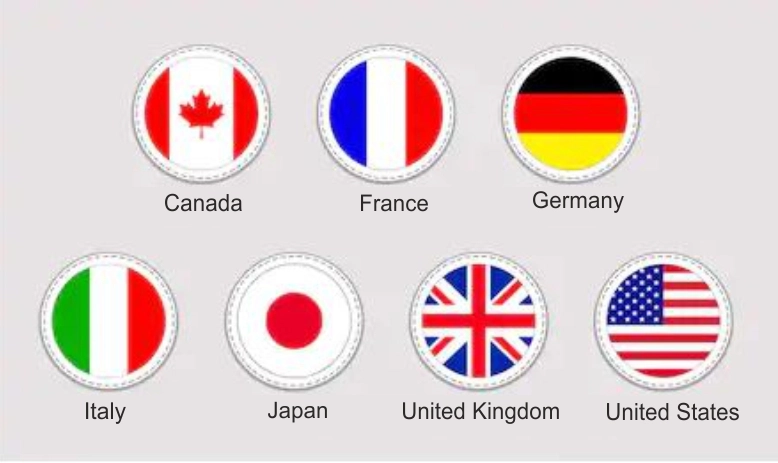Indian Economy
G7 Digital Trade Principles
- 23 Oct 2021
- 7 min read
Why in News
Recently, the Group of Seven (G7) wealthy nations agreed on a joint set of principles to govern cross-border data use and digital trade.
- The deal is a first step in reducing trade barriers, and could lead to a common rulebook of digital trade.
- Earlier, India attended the 47th G7 Summit as a guest country.
Key Points
- Digital Trade: It is broadly defined as trade in goods and services that is either enabled or delivered digitally, encompassing activities from the distribution of films and TV to professional services.
- G7 Digital Trade Principles:
- Open Digital Markets: Digital and telecommunications markets should be competitive, transparent, fair, and accessible to international trade and investment.
- Cross Border Data Flows: To harness the opportunities of the digital economy and support the trade of goods and services, data should be able to flow freely across borders with trust, including the trust of individuals and businesses.
- Safeguards for Workers, Consumers, and Businesses: Labour protections must be in place for workers who are directly engaged in or support digital trade, providing decent conditions of work.
- Digital Trading Systems: To cut red tape and enable more businesses to trade, governments and industry should drive forward the digitisation of trade-related documents.
- Fair and Inclusive Global Governance: Common rules for digital trade should be agreed and upheld at the World Trade Organization (WTO).
- These rules should benefit workers, consumers, and businesses in developing economies, as well as those in developed economies, while safeguarding each country’s right to regulate for legitimate public policy objectives.
- Significance:
- Middle Ground: The deal sets out a middle ground between highly regulated data protection regimes used in European countries and the more open approach of the United States.
- The deal envisages removing unjustified obstacles to cross-border data flows, while continuing to address privacy, data protection, the protection of intellectual property rights, and security.
- Liberalise Digital Trade: The agreement reached by the elite global group is considered to be significant as it could liberalise hundreds of billions of dollars of digital trade.
- Enabling cross border data flows and clarifying the framework for processing and storing data will be required to further expand the contribution of digital exports.
- Middle Ground: The deal sets out a middle ground between highly regulated data protection regimes used in European countries and the more open approach of the United States.
- Associated Concerns:
- The G7 countries have raised concerns about situations where data localisation requirements are being used for protectionist and discriminatory purposes.
- The statement assumes significance as India has been contemplating measures for data localisation.
- Recently, India has scored 90.32% in UNESCAP Global Survey on Digital and Sustainable Trade Facilitation.
- In 2018, the economic value of digital trade-enabled benefits to the Indian economy is estimated to be worth up to USD 35 billion.
Data Localisation
- About: Data localisation is the practice of storing data on any device that is physically present within the borders of the country where the data is generated. As of now, most of this data is stored, in a cloud, outside India.
- Localisation mandates that companies collecting critical data about consumers must store and process them within the borders of the country.
- Advantages of Data Localisation:
- Secures citizen’s data and provides data privacy and data sovereignty from foreign surveillance. Example - Facebook shared user data with Cambridge Analytica to influence voting.
- Unfettered supervisory access to data will help Indian law enforcement ensure better monitoring.
- Disadvantages of Data Localisation:
- Maintaining multiple local data centres may lead to significant investments in infrastructure and higher costs for global companies.
- Splinternet or ‘fractured internet’ where the domino effect of protectionist policy can lead to other countries following suit.
- Indian Scenario:
- Recently, the Reserve Bank of India (RBI) barred three foreign card payment network firms from taking new customers on board over the issue of storing data in India.
- India is contemplating an umbrella legislation on data protection, the Personal Data Protection Bill, 2019.
- As per the bill, the Central Government shall notify categories of personal data as critical personal data that shall only be processed in a server or data centre located in India.
- The Justice BN Srikrishna committee has recommended setting up of a data protection authority and placing restrictions on cross-border data flows.
- India is also opposed to joining any global deal on e-commerce with the Prime Minister refusing to sign the Osaka Track, an overarching framework promoting cross-border data flow, at the recently held G-20 summit.
Way Forward
- Global Cyber Security Framework: Good regulatory frameworks are essential to address issues such as privacy and cybersecurity.
- Thus, on the sideline of negotiations of free flow to digital trade, a global framework for cybersecurity should be established.
- Removing Bureaucratic Hurdles: To maximise the positive impact of digital trade, issues such as undue red tape on digital enterprises, restricted cross-border data flows, and imbalanced copyright and intermediate liability regulations, need to be addressed.
- Role of India: There is an opportunity for India to play a leading role, not only at home, but also abroad in pushing for facilitative digital trade rules in its various bilateral and multilateral trade negotiations.





